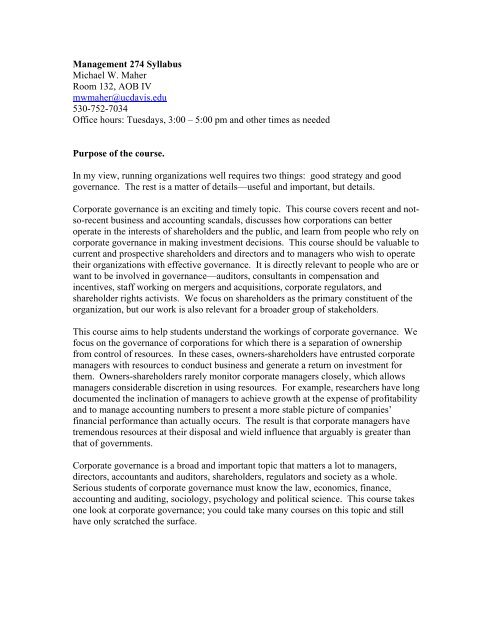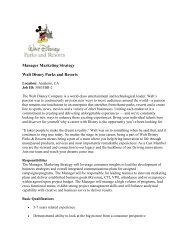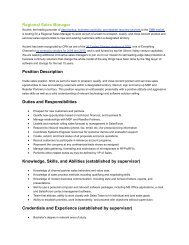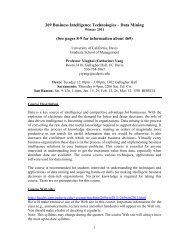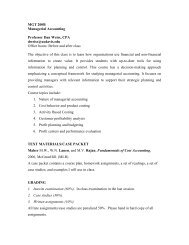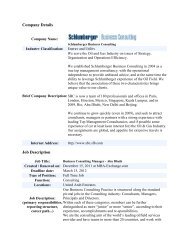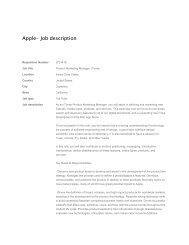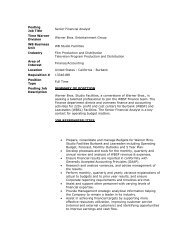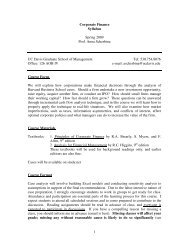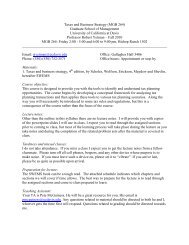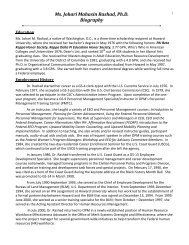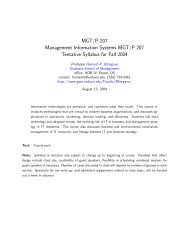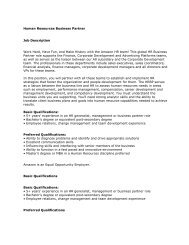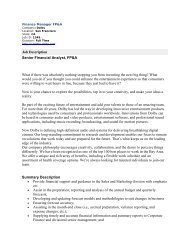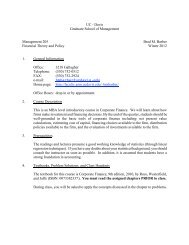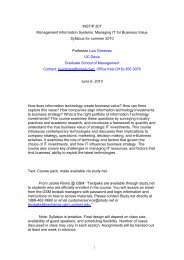MGP 274 - Auditing, Internal Control and Public Accounting - Students
MGP 274 - Auditing, Internal Control and Public Accounting - Students
MGP 274 - Auditing, Internal Control and Public Accounting - Students
You also want an ePaper? Increase the reach of your titles
YUMPU automatically turns print PDFs into web optimized ePapers that Google loves.
Management <strong>274</strong> Syllabus<br />
Michael W. Maher<br />
Room 132, AOB IV<br />
mwmaher@ucdavis.edu<br />
530-752-7034<br />
Office hours: Tuesdays, 3:00 – 5:00 pm <strong>and</strong> other times as needed<br />
Purpose of the course.<br />
In my view, running organizations well requires two things: good strategy <strong>and</strong> good<br />
governance. The rest is a matter of details—useful <strong>and</strong> important, but details.<br />
Corporate governance is an exciting <strong>and</strong> timely topic. This course covers recent <strong>and</strong> notso-recent<br />
business <strong>and</strong> accounting sc<strong>and</strong>als, discusses how corporations can better<br />
operate in the interests of shareholders <strong>and</strong> the public, <strong>and</strong> learn from people who rely on<br />
corporate governance in making investment decisions. This course should be valuable to<br />
current <strong>and</strong> prospective shareholders <strong>and</strong> directors <strong>and</strong> to managers who wish to operate<br />
their organizations with effective governance. It is directly relevant to people who are or<br />
want to be involved in governance—auditors, consultants in compensation <strong>and</strong><br />
incentives, staff working on mergers <strong>and</strong> acquisitions, corporate regulators, <strong>and</strong><br />
shareholder rights activists. We focus on shareholders as the primary constituent of the<br />
organization, but our work is also relevant for a broader group of stakeholders.<br />
This course aims to help students underst<strong>and</strong> the workings of corporate governance. We<br />
focus on the governance of corporations for which there is a separation of ownership<br />
from control of resources. In these cases, owners-shareholders have entrusted corporate<br />
managers with resources to conduct business <strong>and</strong> generate a return on investment for<br />
them. Owners-shareholders rarely monitor corporate managers closely, which allows<br />
managers considerable discretion in using resources. For example, researchers have long<br />
documented the inclination of managers to achieve growth at the expense of profitability<br />
<strong>and</strong> to manage accounting numbers to present a more stable picture of companies’<br />
financial performance than actually occurs. The result is that corporate managers have<br />
tremendous resources at their disposal <strong>and</strong> wield influence that arguably is greater than<br />
that of governments.<br />
Corporate governance is a broad <strong>and</strong> important topic that matters a lot to managers,<br />
directors, accountants <strong>and</strong> auditors, shareholders, regulators <strong>and</strong> society as a whole.<br />
Serious students of corporate governance must know the law, economics, finance,<br />
accounting <strong>and</strong> auditing, sociology, psychology <strong>and</strong> political science. This course takes<br />
one look at corporate governance; you could take many courses on this topic <strong>and</strong> still<br />
have only scratched the surface.
Required books:<br />
1. Richard Monks <strong>and</strong> Nell Minow, Corporate Governance, 3 rd ed, Blackwell<br />
Publishing, 2004.<br />
2. James O’ Loughlin, The Real Warren Buffet: Managing Capital, Leading People,<br />
Nicholas Brealey Publishing, London, 2004. Warren Buffet is an excellent<br />
example of a leading investor who fosters good corporate governance.<br />
(Discussions of corporate governance can get bogged down in the wrong-doing<br />
that we observe. I assign this biography in part because I want to end the course<br />
on a high note.)<br />
Grading:<br />
1. Contribution to class discussion <strong>and</strong> turned in notes on readings <strong>and</strong> cases<br />
(40%). I provide questions about the readings, <strong>and</strong> I assign questions about the<br />
cases. I do not want a formal written report turned in; I want a copy of your<br />
talking notes or notes to yourself as you go through the readings. That way, you<br />
get some credit for contribution to the class even if you are not called on.<br />
2. Course project (40%). Each student will become an expert in one of the recent<br />
frauds—Enron, WorldCom, Tyco, Adelphia, Waste Management, etc.—or Arthur<br />
Andersen & Co. I encourage you to work in teams of two – four persons. Your<br />
assignment is (1) to prepare a four page memo to h<strong>and</strong> out to your classmates one<br />
week before your presentation, (2) to make a presentation in class (approx. 20<br />
minutes) <strong>and</strong> (3) to prepare a paper for me (not limited to four pages). During the<br />
term, you will be the expert in your chosen fraud, <strong>and</strong> I shall expect you to<br />
contribute to the class discussion accordingly. For example, we discuss boards of<br />
directors in session 3, so I will expect you to contribute to that discussion by<br />
stating the role of the board in failing to prevent fraud in your case.<br />
3. Final examination (20%). Open book <strong>and</strong> open notes exam in class.
Session Topics <strong>and</strong> work in class Assignments<br />
1. Jan. 9 Introduction.<br />
Purpose of course.<br />
Overview lecture on corporate<br />
accountability<br />
2. Jan. 18<br />
(Make up<br />
for holiday<br />
on Jan. 16.)<br />
History of key frauds.<br />
Past, present <strong>and</strong> future of corporate<br />
accountability. I present major financial<br />
frauds—South Sea Bubble, Krueger<br />
Match, Equity Funding, ZZZ Best—<br />
many of which led to significant changes<br />
in the legal environment. Overall, we<br />
look at how markets, laws <strong>and</strong> ethics<br />
create corporate accountability. In class,<br />
I shall h<strong>and</strong> out a case or provide a video<br />
for us to discuss.<br />
3. Jan. 23 Shareholders.<br />
Rights <strong>and</strong> responsibilities of management<br />
to shareholders.<br />
The role of shareholders in corporate<br />
governance.<br />
4. Jan. 30 Board of Directors.<br />
The role of the Board of Directors in<br />
corporate accountability.<br />
Presentation by Robert Smiley, Director<br />
<strong>and</strong> former Dean of the GSM.<br />
5. Feb. 6 <strong>Auditing</strong>, internal controls, Sarbanes-<br />
Oxley Act of 2004.<br />
Presentation by Rick Blumenfeld, former<br />
senior partner at Arthur Andersen & Co.<br />
<strong>and</strong> a major player in obtaining closure on<br />
major fraud cases over the past several<br />
years.<br />
6. Feb. 13 Management Performance <strong>and</strong><br />
Compensation<br />
How management incentive plans help or<br />
hurt corporate governance.<br />
Read Monk <strong>and</strong> Minnow<br />
(MM), Introduction <strong>and</strong><br />
Appendix.<br />
Read MM Ch 1,<br />
“Corporations” We won’t<br />
discuss this chapter until<br />
Session 3, but it is a good idea<br />
to get a head start on the<br />
reading because the chapters<br />
are long. Questions about the<br />
reading to be provided. (H<strong>and</strong><br />
in your notes at the beginning<br />
of Session 3.)<br />
Read MM Ch. 2,<br />
“Shareholders”<br />
Discuss questions covering<br />
chapters 1 <strong>and</strong> 2. Questions<br />
about the reading to be<br />
provided. (H<strong>and</strong> in your<br />
notes on Ch. 1 <strong>and</strong> 2 at the<br />
beginning of Session 3.)<br />
Read MM Ch. 3, “Directors<br />
<strong>and</strong> the Board”. Questions<br />
about the reading to be<br />
provided.<br />
Discuss General Motors case<br />
(all parts) from MM. Answer<br />
questions at end of case.<br />
(H<strong>and</strong> in your notes on Ch.<br />
3<strong>and</strong> the GM case at the<br />
beginning of Session 4.)<br />
To be announced.<br />
Read MM Ch. 4,<br />
“Management Performance<br />
<strong>and</strong> Compensation”.<br />
Questions about the reading to
e provided (H<strong>and</strong> in your<br />
notes on Ch. 4 at the<br />
beginning of Session 6.)<br />
7. Feb. 20 Holiday This “off week” is a good<br />
time to put the finishing<br />
touches on the course project.<br />
8. Feb. 27 The Real World<br />
1. Presentation by D. James Sogas on<br />
“Ethics: Hard Lessons Learned from Not<br />
Sounding the Alarm” Mr. Sogas is an<br />
engineer who has first h<strong>and</strong> experience in<br />
the consequences of being on the edge of<br />
wrong-doing.<br />
2. Crossing Country Lines<br />
3. Project Presentations<br />
Read MM Ch. 5,<br />
“International Issues”<br />
Questions about the reading to<br />
be provided. (H<strong>and</strong> in your<br />
notes on Ch. 5 at the<br />
beginning of Session 8.)<br />
9. Mar. 6 The Real World<br />
Warren Buffet<br />
Project Presentations<br />
10. Mar. 13 The Real World<br />
Warren Buffet<br />
Project Presentations<br />
11. Final exam (open book, open notes, inclass<br />
exam).<br />
Read The Real Warren Buffet,<br />
Ch. 1-4. Questions about the<br />
reading to be provided. (H<strong>and</strong><br />
in your notes on WB ch. 1 – 4<br />
at the beginning of Session 9.)<br />
Read The Real Warren Buffet,<br />
Ch. 6-10. Questions about the<br />
reading to be provided. (H<strong>and</strong><br />
in your notes on WB ch. 6 - 10<br />
at the beginning of Session<br />
10.)


